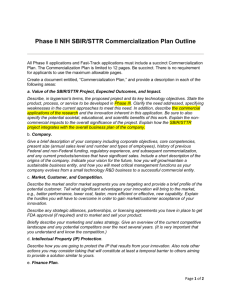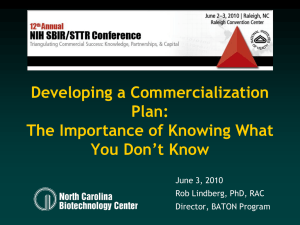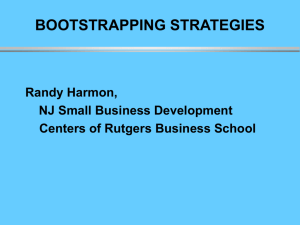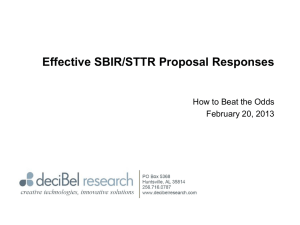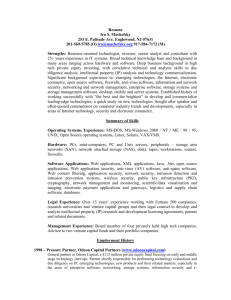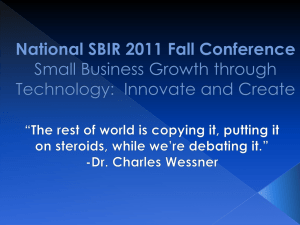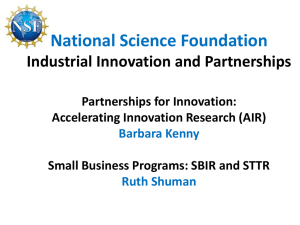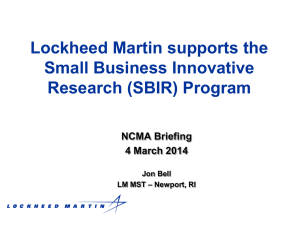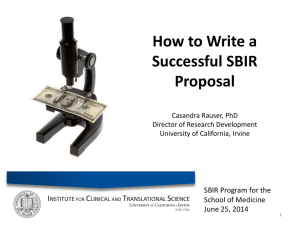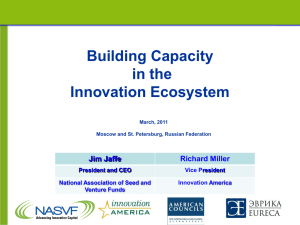What is a commercialization Strategy?
advertisement
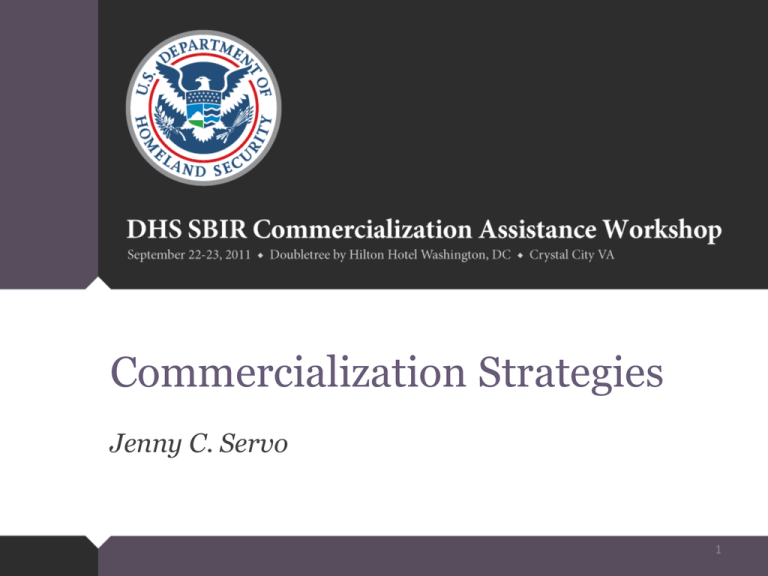
Commercialization Strategies Jenny C. Servo 1 Overview • What is commercialization? • What is a commercialization Strategy? • Factors that effect your choice of a strategy • Sample strategies 2 What is commercialization? » “The process of developing markets and producing and delivering products or services for sale (whether by the originating party or by others)... commercialization includes both government and nongovernment markets.” -National Science Foundation SBIR Solicitation 3 What is a commercialization strategy? Not defined in solicitations...but alluded to “...your company’s strategy for converting your proposed SBIR research into a product or non-R&D service with widespread commercial use - including private sector and/or military markets.” - DoD SBIR solicitation 4 Commercialization Strategy The series of financing options that a company entertains to move its technology from concept to the marketplace Milestones How funded? Concept Development Phase 1 Business Case Analysis G&A Prototype Development Phase II Intellectual Property Protection Retained Earnings Beta Testing Corporate Partners U/L approval Retained earnings Test Market Introduction ??? Marketing ??? Scale Up Production ??? 5 Financing Roadmap SBIR and STTR Funding Founders Sweat Equity On spec High Risk Basic Science Mission Hybrid Applied NSF NIH DoD NASA DOE DHS DOT EPA ED USDA Federal Science for Hire State Corporations $ Family friends Debt Banks Economic Dev. Licensing Partnerships Subcontracts Leasing Business angels Equity Accounts Association Attorneys Bankers Brokers Consultants Databases Print Media Venture capital Investment Banker Profit 6 Strategy Selection Process » Iterative ... build and test » Articulate at the outset and » Revisit › as you collect additional market data › as you develop the business case › during negotiations with partner/investor 7 Commercialization Choices • Factors which effect your choice of a commercialization strategy » Mission » Vision » Business philosophy » Your current situation » Window of opportunity » Competitors 8 Mission » Identity Statement › › › › Business functions Products and technologies Markets served Sustainable competitive advantage » For a company or a strategic business unit (SBU) 9 Elements of Vision » 5-years out › Financial goals - revenue goals, profit margin goals › Market goals - customers served, market niche, geographic region, market share › Products and services › Image- How will you be perceived by customers, competitors, employees, community 10 Typology of Visions Revenues Employees Purpose Pubic/Private Life Style $3M 20 Support owners Private Foundation $10-30M 200+ Start new industry Private High Potential Venture $30 - $100 M 500+ Create value Public The numbers are meant to be relative, not absolute 11 Sample Strategy - Licensing VISION: Life-Style Company BUSINESS PHILOSOPHY Do what I enjoy MILESTONES FUNDING MECHANISM Start Up Sweat equity Concept Development SBIR Intellectual Property Protection Retained Earnings Application Development Licensee Production Licensee 12 Sample Strategy – Strategic Alliance VISION: Foundation Company R&D and Manufacturing BUSINESS PHILOSOPHY Conservative MILESTONES FUNDING MECHANISM Start-Up Sweat equity Concept Development SBIR Intellectual Property Protection Retained Earnings Prototype Development SBIR Production Scale Up Equity investor, converted to debt Marketing and Sales Strategic ally 13 Sample Strategy - IPO VISION: High Potential Venture BUSINESS PHILOSOPHY I want to try it all MILESTONES FUNDING MECHANISM Concept Development Federal funding Prototype Development Seed financing from angels Market Test Retained earnings Market Introduction Equity investment from Fortune 500 Scale Up Second Round Financing from VC New Facility Private Placement Expansion Line of credit, profits Market Penetrations IPO 14
